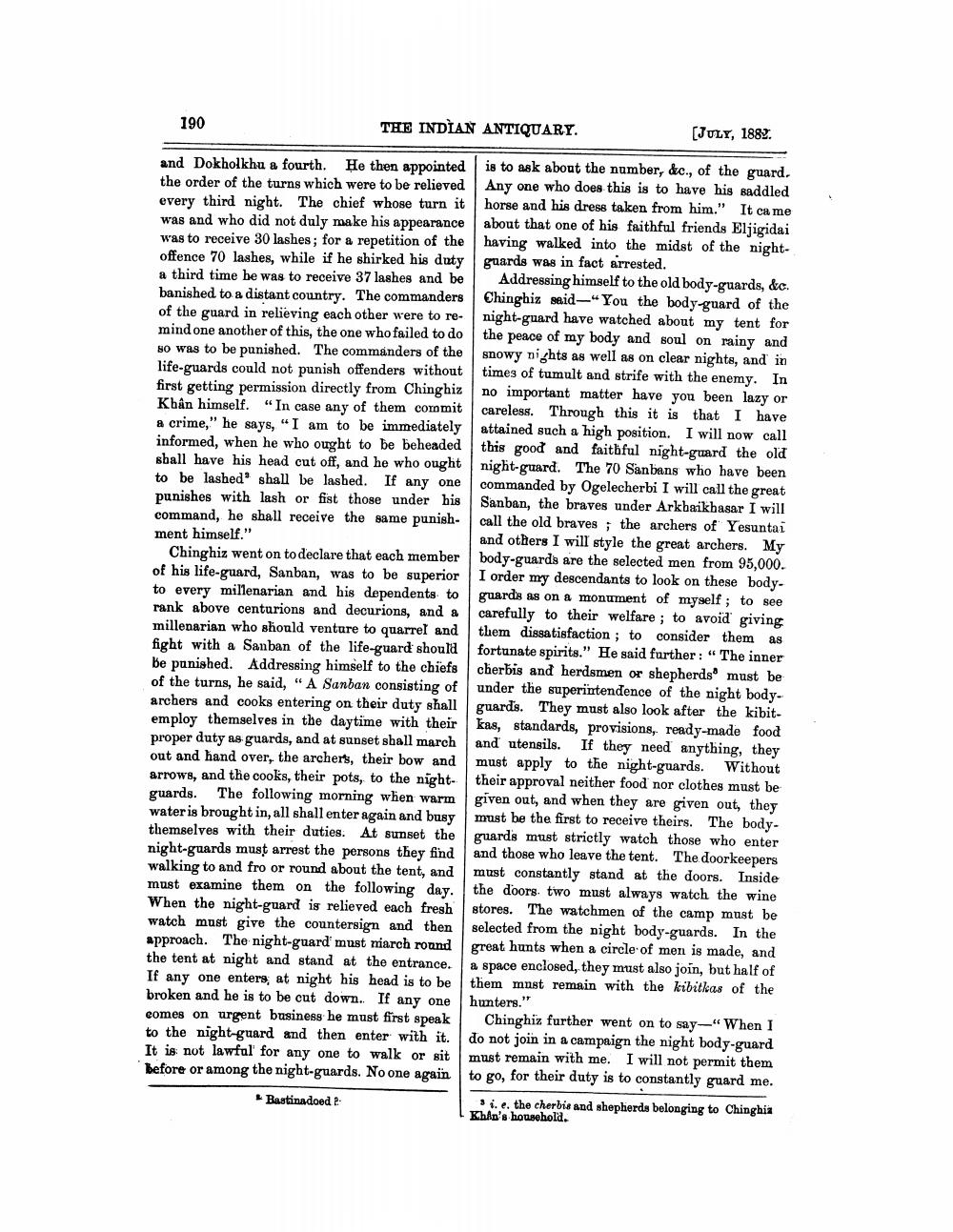________________
190
THE INDIAN ANTIQUARY.
(JULY, 1889.
and Dokholkhu a fourth. He then appointed the order of the turns which were to be relieved every third night. The chief whose turn it was and who did not duly make his appearance was to receive 30 lashes; for a repetition of the offence 70 lashes, while if he shirked his duty a third time he was to receive 37 lashes and be banished to a distant country. The commanders of the guard in relieving each other were to re- mind one another of this, the one who failed to do 50 was to be punished. The commanders of the life-guards could not punish offenders without first getting permission directly from Chinghiz Khân himself. “In case any of them commit a crime," he says, "I am to be immediately informed, when he who ought to be beheaded shall have his head cut off, and he who ought to be lashed shall be lashed. If any one punishes with lash or fist those under his command, he shall receive the same punishment himself."
Chinghiz went on to declare that each member of his life-guard, Sanban, was to be superior to every millenarian and his dependents to rank above centurions and decurions, and a millenarian who should venture to quarrel and fight with a Sanban of the life-guard should be punished. Addressing himself to the chiefs of the turns, he said, “A Sanban consisting of archers and cooks entering on their duty shall employ themselves in the daytime with their proper duty as guards, and at sunset shall march out and hand over, the archerts, their bow and arrows, and the cooks, their pots, to the nightguards. The following morning when warm water is brought in, all shall enter again and busy themselves with their duties. At sunset the night-guards must arrest the persons they find walking to and fro or round about the tent, and must examine them on the following day. When the night-guard is relieved each fresh watch must give the countersign and then approach. The night-guard must miarch roand the tent at night and stand at the entrance. If any one enters, at night his head is to be broken and he is to be cut down. If any one comes on urgent business he must first speak to the night-guard and then enter with it. It is not lawful' for any one to walk or sit before or among the night-guards. No one again
is to ask about the number, &c., of the guard. Any one who does this is to have his saddled horse and his dress taken from him." It ca me about that one of his faithful friends Eljigidai having walked into the midst of the nightguards was in fact arrested.
Addressing himself to the old body-guards, &c. Chinghiz seid- You the body guard of the night-guard have watched about my tent for the peace of my body and soul on rainy and snowy nights as well as on clear nights, and in times of tumult and strife with the enemy. In no important matter have you been lazy or careless. Through this it is that I have attained such a high position. I will now call this good and faithful night-guard the old night-guard. The 70 Sanbans who have been commanded by Ogelecherbi I will call the great Sanban, the braves under Arkbaikhasar I will call the old braves ; the archers of Yesuntai and others I will style the great archers. My body-guards are the selected men from 95,000. I order my descendants to look on these bodyguards as on a monument of myself; to see carefully to their welfare ; to avoid giving them dissatisfaction; to consider them as fortunate spirits." He said further : “ The inner cherbis and herdsmen or shepherds must be under the superintendence of the night bodyguards. They must also look after the kibitkas, standards, provisions, ready-made food and utensils. If they need anything, they must apply to the night-guards. Without their approval neither food nor clothes must be given out, and when they are given out, they must be the first to receive theirs. The body. guards must strictly watch those who enter and those who leave the tent. The doorkeepers must constantly stand at the doors. Inside the doors two must always watch the wine stores. The watchmen of the camp must be selected from the night body-guards. In the great hunts when a circle of men is made, and a space enclosed, they must also join, but half of them most remain with the kibitkas of the hunters."
Chinghiz further went on to say-"When I do not join in a campaign the night body-guard must remain with me. I will not permit them to go, for their duty is to constantly guard me.
Sie the cherbis and shepherds belonging to Chinghia Khan's househola.
Rastinadoed?




